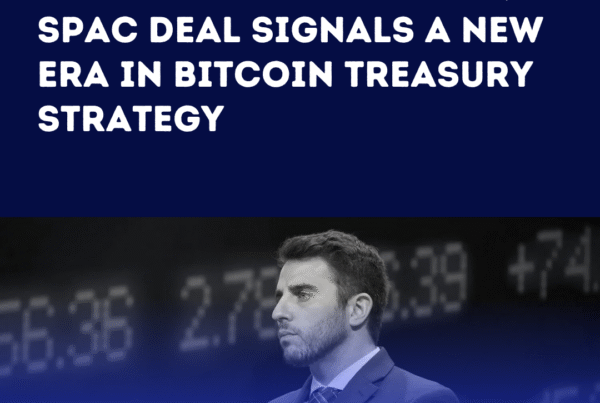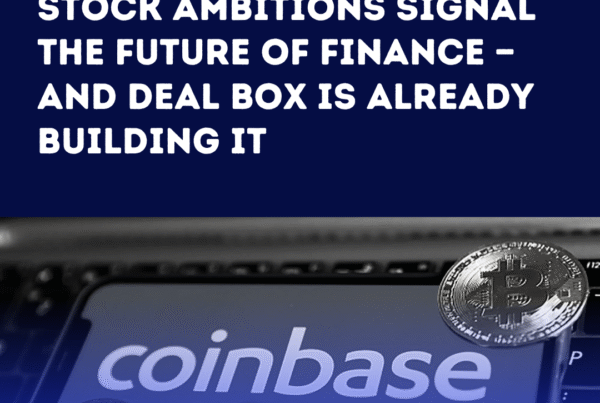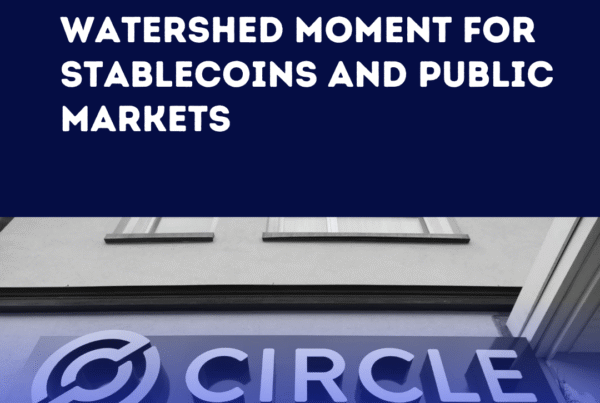
Embracing the Future of Finance: Enabling the Bright New Tokenization Era
The financial world is on the brink of a transformative revolution driven by the incredible potential of blockchain technology. As banks and financial institutions increasingly move their operations on-chain, a new era of finance is emerging. In this blog post, we will explore the profound opportunities presented by tokenization and how Deal Box and True I/O are at the forefront of enabling this inevitable evolution.
The Inevitability of On-Chain Finance
In recent years, blockchain technology has captured the financial industry’s attention, promising to revolutionize traditional capital markets. As blockchain adoption accelerates, major financial institutions realize its transformative power for their operations. Forward-thinking banks and financial services companies have started moving their operations on-chain to unlock deep liquidity for previously illiquid assets, reduce costs through automated workflows, and foster higher-integrity markets.
According to a recent industry brief, the future of finance is undoubtedly shifting towards blockchain-based solutions. This shift presents many opportunities for institutions to embrace this emerging technology and capitalize on the massive economic shift it offers.
Unlocking the Potential of Tokenization
At the heart of this transformation lies tokenization, a process that converts real-world assets into digital tokens on the blockchain. The magnitude of traditional markets, estimated at $867 trillion, makes them prime targets for disruption through tokenization. This process allows fractional ownership and trading of previously illiquid assets, creating a more inclusive and accessible market for investors.
A survey by BNY Mellon and Celent revealed that 97% of institutional investors agree that “tokenization will revolutionize asset management.” The appeal of tokenization lies in its ability to drive efficiencies in capital markets, shorten value chains, and improve cost and access for investors. By facilitating the division of assets into tokens, tokenization opens the door to a multi-hundred-trillion-dollar opportunity for early adopters.
The Power of Tokenization
Tokenization presents a multitude of advantages that make it an inevitable evolution for the financial industry:
Integrity: One of the fundamental attributes of blockchain technology is its immutable and transparent nature. On-chain transactions are verifiable and tamper-proof, reducing counterparty risk and fostering trust within the financial ecosystem.
Liquidity: Traditionally, certain assets, such as real estate or fine art, have been challenging to sell due to their illiquid nature. Tokenization unlocks liquidity for these assets by allowing them to be represented as tradable tokens, increasing their marketability and accessibility.
Utility: The automated execution of smart contracts on the blockchain streamlines financial workflows, reducing costs and enhancing operational efficiency. Automated processes such as dividend distribution, proxy voting, and fund performance data dissemination are made seamless through smart contracts.
Transparency: Transparency is critical in the financial industry. Blockchain technology ensures increased auditability, offering real-time access to transaction data and smart contract execution. This enhanced transparency promotes trust and accountability among all stakeholders.
Enabling Efficient Smart Markets
Smart contracts are pivotal in on-chain finance, automating financial market workflows with precise execution based on predefined conditions. Their capabilities enable 24/7/365 payment windows for cash and securities transfers, enhancing speed, reliability, and transparency in financial transactions.
Additionally, adopting digital assets and smart contracts streamlines various industry processes. For example, distributing fund performance data becomes faster, more reliable, and more transparent. Capturing proxy votes becomes efficient, ensuring increased resiliency and accessibility in voting processes. Moreover, the improvement of dividend distribution enhances capital efficiency for investors.
Pioneering Cross-Chain Interoperability
The bright new tokenization future necessitates standardized and interoperable solutions that integrate seamlessly with existing backend systems. Deal Box and True I/O have recognized this need and actively support cross-chain interoperability standards.
This cross-chain interoperability empowers institutions to interact securely with on-chain markets. By configuring the Cross-Chain Interoperability Protocol (CCIP), underpinned by advanced blockchain technology, institutions can seamlessly connect existing backend systems to any blockchain, ensuring secure and efficient transactions.
Deal Box and True I/O: Leading the Tokenization Future
As pioneers in the financial industry, Deal Box and True I/O have embraced the power of blockchain technology and are spearheading the tokenization revolution. Their commitment to establishing cross-chain interoperability standards allows for a broader financial ecosystem where liquidity can seamlessly flow across on-chain markets.
Conclusion
The future of finance is undoubtedly shaped by blockchain technology and the inevitable shift toward tokenization. With Deal Box and True I/O at the forefront of this evolution, financial institutions have the opportunity to harness the full potential of blockchain and capitalize on this bright new tokenization era.
As we embrace this transformative journey towards on-chain finance, collaboration and foresight are crucial. We can build a financial landscape that drives deep liquidity, reduces costs, and fosters market integrity by working together. As the world embraces this new era of finance, Deal Box and True I/O are poised to drive the transformation and unlock the full potential of the tokenization future.
Disclaimer: The statistics mentioned in this blog post are based on industry sources, and the content does not directly mention or endorse specific third-party entities or technologies. Instead, it focuses on the themes highlighted in the original article to promote a broader understanding of the tokenization future.
Sources
Size of traditional markets poised for disruption by tokenization ($867T):
Source: World Economic Forum (2021)
Link: https://www.weforum.org/agenda/2021/06/what-is-the-future-of-finance-tokenisation-and-defi/
Percentage of institutional investors agreeing that “tokenization will revolutionize asset management” (97%):
Source: BNY Mellon and Celent (2022)
Link: https://www.bnymellon.com/us/en/our-thinking/issue-17/talking-tokenisation.jsp
Expected growth rate of tokenization in private markets by 2030 (80x):
Source: Citi (2023)
Tokenization of Illiquid Assets To Be 10% Of Global GDP by 2030:
Source: BCG (Boston Consulting Group) (2022)
Link: https://www.bcg.com/en-gb/publications/2022/tokenization-driving-new-investment-opportunities
Additional Data Points:
Global financial institutions experimenting with Swift and CCIP for interoperability:
Source: J.P. Morgan and Celent (2022)




